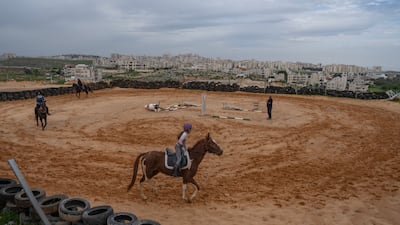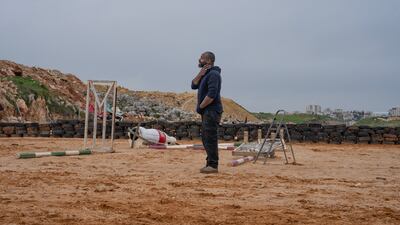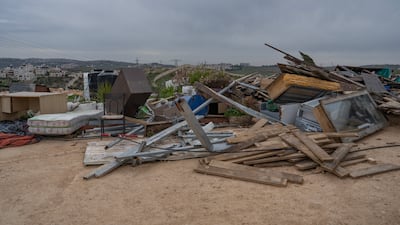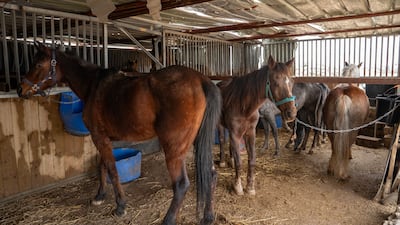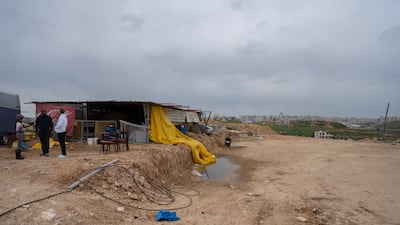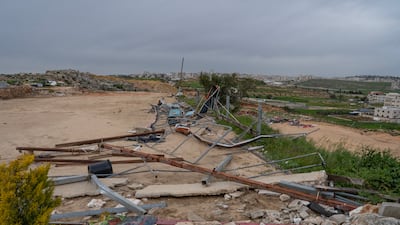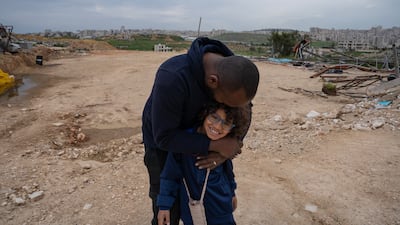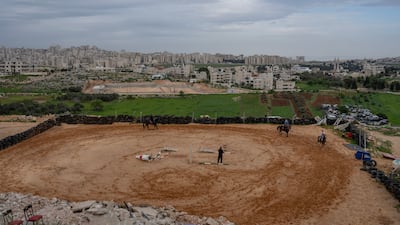Live updates: Follow the latest news on Israel-Gaza
It took Khaled Ifranji seven years to develop his horse-riding livelihood project on the outskirts of Jerusalem with the hope of bringing a little bit of joy to the community.
In just a day all of his hard work was reduced to rubble. Devastated but determined, the father-of-three is now attempting to rebuild the Palestinian Equestrian Club from scratch.
It was about 7.30am when Ifranji, 37, got the call from his staff member on January 30 that Israeli security forces had arrived at his riding school with a bulldozer, intending to demolish it.
He jumped into his car and raced over to the club as fast as he could, but when he arrived he was powerless to stop them.
The horses were still in their stables when the demolition began. Frightened by the chaos, they eventually escaped but ran down to the main road where one was hit by a car but was not seriously injured.
“There was no demolition order. They can’t do this without a demolition order,” Mr Ifranji told The National at the site, which currently resembles a rubbish dump. The love and energy poured into the place is now unrecognisable.
Since the outbreak of the war in Gaza following the October 7 attack by Hamas last year, rights activists have reported a major escalation in violence and forced displacement of Palestinians in the occupied West Bank.
Staggered down a hill over two levels on land that Mr Ifranji rents from the Ministry of Awqaf and Religious Affairs, the riding club boasts a 360 degree vantage that includes Ramallah and waves of green hills, as well as the Israeli settlement of Giv’at Ze’ev in the distance.
In the past two months, Mr Ifranji has rebuilt a makeshift stable to house the horses all together for the time being, and managed to get half of one of the two arenas in working order again. He says Israeli forces removed the sand from both arenas and it’s costly to buy more.
The site also had a cafeteria and an office, as well as a wooden-framed viewing area and 35 solar panels to power the site. Mr Ifranji had put down artificial grass and added a fire pit for evening outdoor gatherings. The Israeli authorities destroyed everything.
The money Mr Ifranji earned through riding lessons allowed him to offer free riding sessions to children with disabilities and those from poorer households who couldn’t afford the fees.
Mr Ifranji’s mission had been to create an oasis of calm in otherwise tumultuous circumstances for Palestinians living under Israeli occupation. He had about 50 clients per week and 10 of the 30 horses on the premises belonged to other people who were boarding them there.
“I was in shock afterwards. I didn’t want to talk to anyone. I didn’t know whether to cry or shout,” said Mr Ifranji. “I spent all my money on this project to create something good.”
Since October 7, more than 1,600 Palestinians have been displaced due to home demolitions, at least half of whom were displaced in operations carried out by Israeli forces. In addition, at least 1,240 Palestinians, including about 600 children, from at least 20 herding communities, have been displaced amid settler violence and access restrictions.

The riding club is built in Area C of the occupied West Bank, in a place called Qalandiya. The territory was divided into three administrative zones when the Oslo Accords were signed. In Area A, the Palestinian Authority (PA) administers civil and security matters; Area B is where the PA administers only civil matters; and in Area C, Israel maintains full control.
Mr Ifranji was issued a notice to stop building any further infrastructure in 2018. According to him, he abided by the order and had no further issues apart from a visit from the Israeli authorities in 2021. The Israeli authorities are supposed to issue a demolition notice before conducting an operation but Mr Ifranji says no such documentation was given before the centre was razed.
“There’s nowhere in Areas A or B that has the space we need or further enough away from residents so as not to disturb people,” said Mr Ifranji, who has no choice but to rebuild in the same location.
A Go Fund Me page has been set up to try to raise the desperately needed funds to get the centre going again.
Allegra Pacheco, who heads the West Bank Protection Consortium, describes how a coercive environment is created so that Palestinian residents have no option but to leave.
“Ninety-nine per cent of Palestinian permit applications in Area C are rejected by the Israelis. They have to go on with their lives anyway, so they build,” she said.
“The Israeli settlement movement along with most of the Israeli government want to prevent a Palestinian state. They’re targeting Area C because it’s the largest and a key area in the West Bank that connects areas A, B and C. This land is critical for Palestinians to have a viable Palestinian state.”
Israel’s co-ordinator of government activities in the territories did not respond to The National's request for comment.

